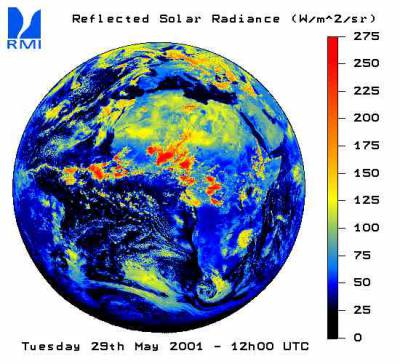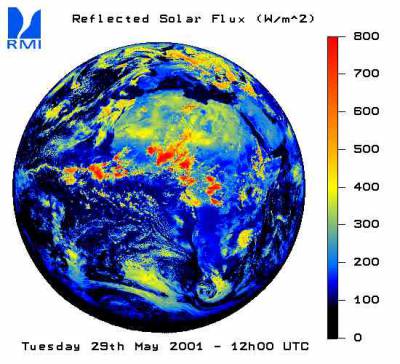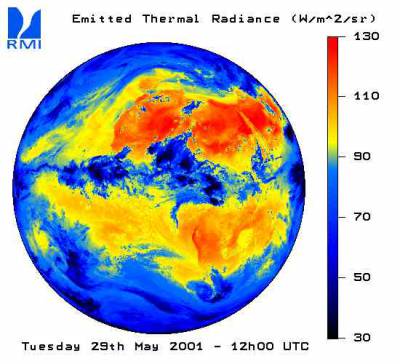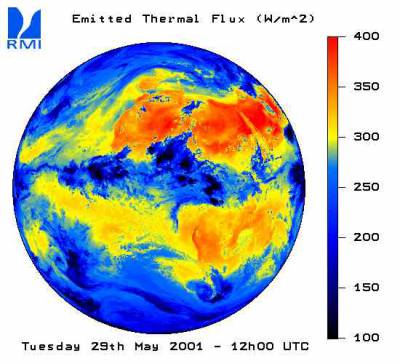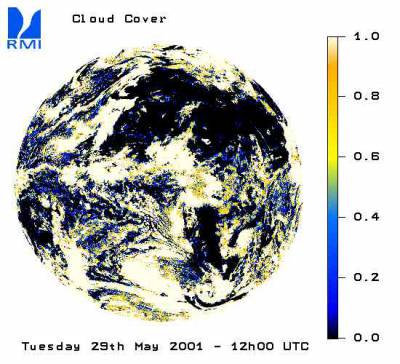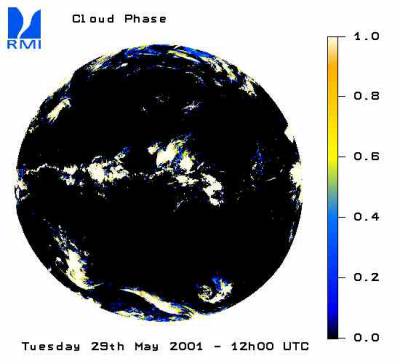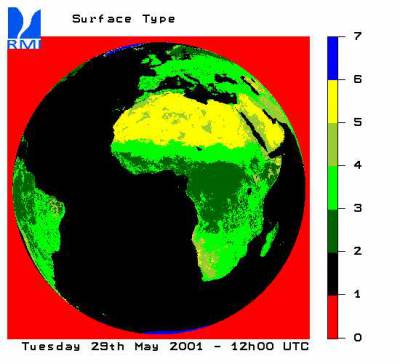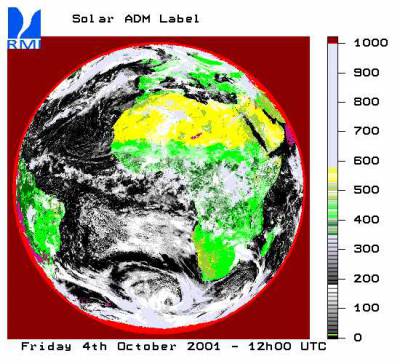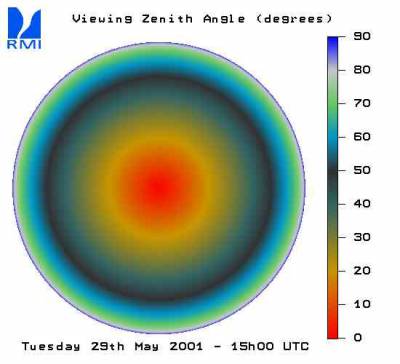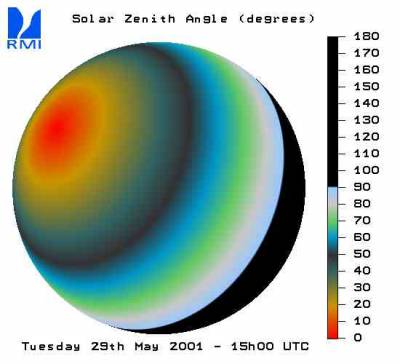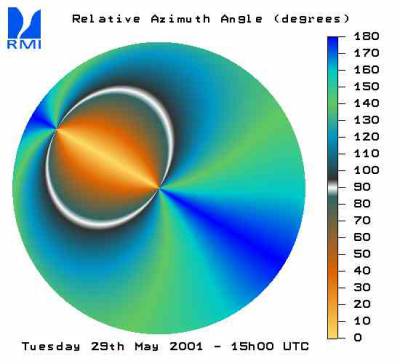Table of Contents
GERB Data Content
These pages aim to give you a visual description of the main fields contained in the GERB data files. For each field, a short description is given and a false color image is presented. The full list and description of the GERB data content is available in the GERB level 2 User Guide.
/Radiometry
/Radiometry/Solar Radiance
The solar radiance gives the quantity of the incoming solar radiation which is reflected by the Earth-atmosphere system in the direction of the observer (i.e. the GERB radiometer on MSG). The higher values for the solar reflected radiance are observed over optically thick cloud cover located close to the Sun-subpoint where the illumination is maximum. The physical unit for this quantity is the Watt per square meter per steradian (W/m2/sr). In the GERB data files, the reflected solar radiance is quantified using a quantification factor 0.05 W/m2/sr.
/Radiometry/Solar Flux
This field gives the quantity of the incoming solar radiation which is reflected by the Earth-atmosphere system. The higher values for the solar reflected flux are observed over optically thick cloud cover located close to the Sun-subpoint where the illumination is maximum. The physical unit for this quantity is the Watt per square meter (W/m2). In the GERB data file, the solar flux is quantify using a quantification factor 0.25 W/m2.
/Radiometry/Thermal Radiance
This field gives the quantity of energy thermally emitted by the Earth-atmosphere system in the direction of the observer (the GERB radiometer on MSG).The higher values for the thermal radiance are observed over hot desert areas under clear sky conditions. Clouds usually cause a decrease of the thermal emission from the Earth to the space (greenhouse effect of clouds). The physical unit for this quantity is the Watt per square meter per steradian (W/m2/sr). In the GERB data file, the thermal radiance is quantified using a quantification factor 0.05 W/m2/sr.
/Radiometry/Thermal Flux
This field gives the quantity of energy thermally emitted by the Earth-atmosphere system. The higher values for the thermal flux are observed over hot desert areas under clear sky conditions. Clouds usually cause a decrease of the thermal emission from the Earth to the space (greenhouse effect of clouds). The physical unit for this quantity is the Watt per square meter (W/m2). In the GERB data file, the thermal flux is quantify using a quantification factor 0.25 W/m2.
/Scene Identification
/Scene Identification/Cloud Cover
This field estimates the percentage of the pixel surface which is covered by cloud. The cloud cover is expressed in percent. The range is then [0:100] by step of 1%.
/Scene Identification/Cloud Optical Depth (logarithm)
Not available at the moment.
/Scene Identification/Cloud Phase
This field estimates the fraction of clouds which have ice phase for each data pixel. Obviously, this ratio is not defined for cloud free pixel (pixel with cloud cover = 0.0). In this case, the cloud phase is set to 0. The cloud phase is expressed in percent. The range is then [0:100] by step of 1%. The 0% value corresponding to pixels with only water cloud and the value 100% corresponding to pixels covered only by ice clouds.
/Scene Identification/Surface Type
This field gives a rough classification of the type of surface. This classification is the one used to derive the CERES-TRMM Angular Dependency Models. The code is given in the table hereafter.
Code for Surface Type
| value | surface type |
|---|---|
| 0 | undefined |
| 1 | Ocean |
| 2 | Mod-Hi Tree/Shrub |
| 3 | Low-Mod Tree/Shru |
| 4 | Dark Desert |
| 5 | Bright Desert |
| 6 | Snow and Ice |
/Scene Identification/Solar Angular Dependency Model
This field gives the label of the ADM used to convert the solar reflected radiance into the corresponding flux. As the CERES-TRMM ADMs set is used for the GERB solar radiation, the label is the same as the one used by the CERES team.
CERES-TRMM Code
The code is available on the web site of the CERES inversion group (led by Norman Loeb).
| value | scene |
|---|---|
| 0 | undefined |
| 1-10 | clear ocean |
| 11-14 | clear land |
| 15-350 | cloud over ocean |
| 351-590 | cloud over land |
| 591 | snow |
| 1001 | Averaged model |
| 1002 | Lambertian model (R=1) |
| 1003 | No flux (F=0) |
/Angles
/Angles/Viewing Zenith
This field gives zenith angle of the GERB instrument (the observer) for each pixel in the data file. The physical unit for this quantity is the degree. In the GERB data file, the viewing zenith angle is quantified using a quantification factor 0.1 degree.
/Angles/Solar Zenith
This field gives zenith angle of the Sun for each pixel in the data file. The physical unit for this quantity is the degree. In the GERB data file, the solar zenith angle is quantified using a quantification factor 0.1 degree.
